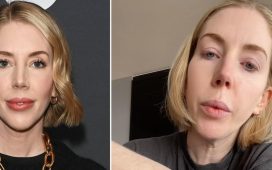“All writing is a kind of lying,” says Suzy, the protagonist of Jacqueline Maley’s debut novel, The Truth About Her.
Her words echo those of Janet Malcolm’s from her 2018 book The Journalist and the Murderer: “Every journalist who is not too stupid or too full of himself to notice what is going on knows that what he does is morally indefensible.”
Through Suzy, and drawing on her own experience as a journalist, Maley explores the moral implications of journalism, writing and casting someone as the unwilling subject of a story.
Suzy’s expose is of Tracey Doran, a 28-year-old wellness blogger who has made a name for herself as a Belle Gibson-esque health guru, crediting her lifestyle and clean eating for curing her cancer. When Suzy outs her as a liar and a fraud, Doran commits suicide, leaving Suzy to grapple with feelings of guilt and responsibility.
Her emotions are compounded by the loss of her job, several romantic entanglements and the challenges of single motherhood. When Tracey’s mother, Jan, demands that Suzy write the “truth” about her daughter, Suzy feels she has no choice but to comply.
Jan’s arrival on Suzy’s doorstep is the major hook of the novel. She knows things about Suzy’s life that she shouldn’t – and after Suzy has received several mysterious packages with mementos from Tracey’s earlier life. Despite coming across as gaudy and physically unintimidating, there is an underlying threat to Jan’s presence – her overly cheerful greetings and her persistence are underpinned by the reader’s knowledge that she holds Suzy responsible for her daughter’s death.
The relationship and tension between Jan and Suzy is excellent – complex, gripping and beautifully realised. Their shared experience as single mothers means that over the course of their sessions – in which Suzy interviews Jan about Tracey’s childhood and adolescence – they form an unexpected bond. Both hold grief and guilt around motherhood, birth trauma and the various ways in which they feel they have failed their children. The push-pull of their empathy reveals surprising intimacy, which Suzy grapples to understand: “I thought of all of the things I had that I didn’t deserve, with Maddy being the top of the list and Jan’s compassion for me, in a crisis of my motherhood, running a close second.”
Suzy’s “crisis of motherhood”, which plays out in ways both small and large (late-night trips to the hospital, guilt at not being able to provide Maddy with ballet lessons, morning shouting matches over breakfast), is at times intensely relatable. As a single mother (another similarity between author and protagonist), Suzy worries she isn’t enough for her daughter – isn’t calm enough, financially stable enough, present enough. As Suzy tries to carve out a career and identity alongside her role as mother, this fury of emotion will resonate with all mothers, and particularly for single mothers who often work multiple jobs alongside the demands of parenting.
On the other hand, Suzy’s envy of the “park mothers” – women who she views as more secure than she is, with the time to grow herbs, the foresight to carry the “right” snacks, and the financial security to provide their children with all requisite luxuries – is less relatable. The envy itself certainly reads as genuine, but the interactions are superficial and fail to acknowledge the realities of the “park mums” beyond their perceived privilege (and also fails to address Suzy’s own privilege as a white, middle-class woman with access to a cheap house in the middle of a pricey Sydney suburb). Here, and in several other moments, Suzy reads as too naive, which is at odds with her intellect and insight.
An award-winning journalist herself, there’s no doubt that Maley knows how to tell a good story. Her reflections on journalism and the moral responsibilities of writer to subject are the guts of The Truth About Her, offering a rare insight into the ethical dilemma of the journalist. It is refreshing to see such a detailed representation of single motherhood in print, and while there are moments where Suzy’s experience is somewhat one-dimensional, her friendship with Jan and the context of their conversations paints a far more nuanced reflection on the traumas of birth and motherhood. Maley’s debut asks some timely and necessary questions about truth, love and our responsibility to others.














